Analysis of International Business Law and Ethics Cases
VerifiedAdded on 2022/11/13
|15
|3493
|406
Homework Assignment
AI Summary
This assignment delves into the complexities of international business law and ethics through the analysis of several case studies. It examines the applicability of the UN Convention on the Use of Electronic Communications in International Contracts, addressing questions of contract validity, signatory requirements, and exclusions. The assignment further explores the inclusion and essentials of Incoterms in sale contracts, specifically focusing on DAP provisions. It also analyzes the legal grounds for preventing the enforcement of arbitration awards under the New York Convention 1958, and assesses whether a contract is governed by the United Nations Convention on Contracts for the International Sale of Goods (CISG), identifying key elements of contract formation under CISG. The assignment utilizes the IRAC method to structure its responses, ensuring a clear presentation of legal issues, rules, application, and conclusions.
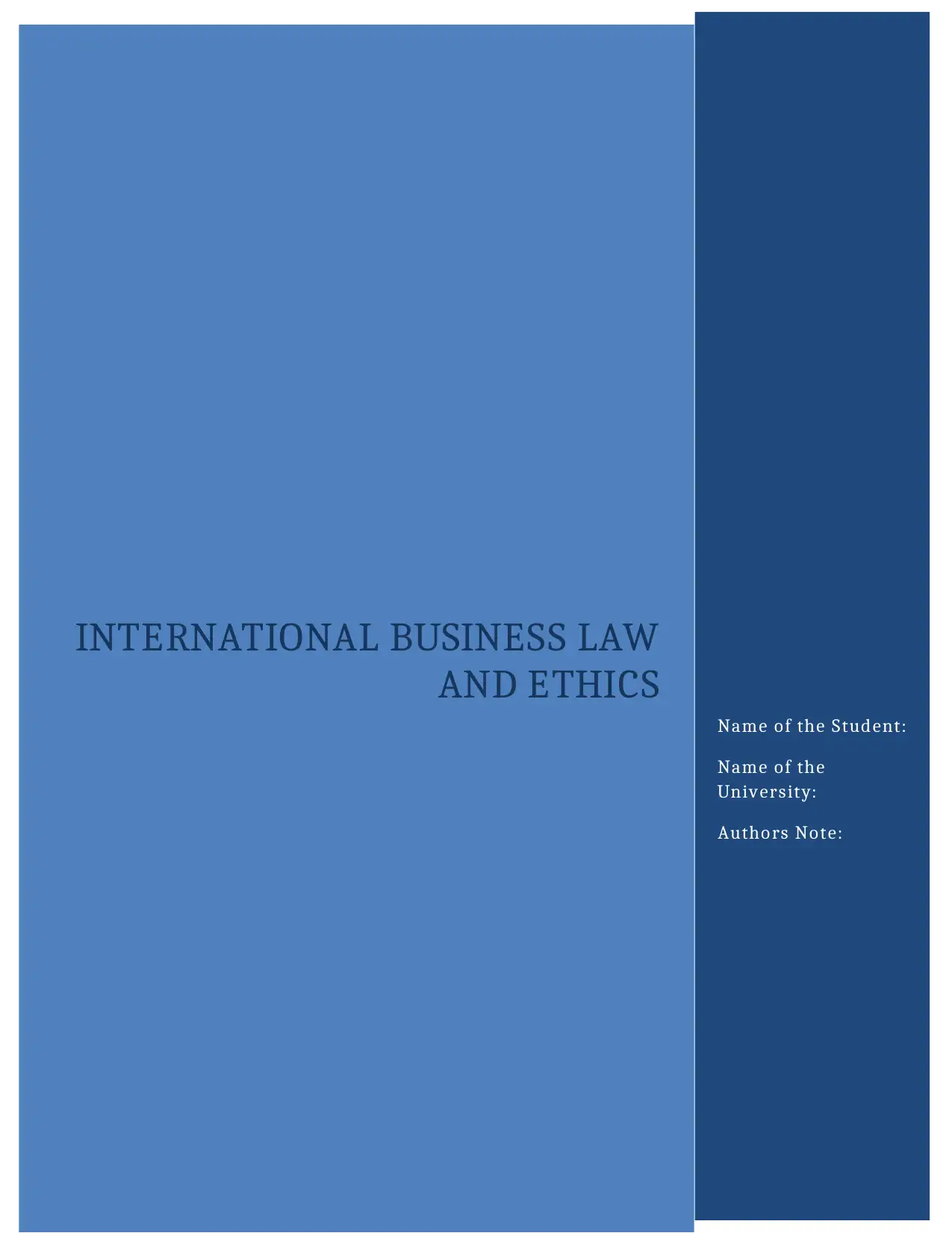
Running head: INTERNATIONAL BUSINESS LAW AND ETHICS
INTERNATIONAL BUSINESS LAW
AND ETHICS Name of the Student:
Name of the
University:
Authors Note:
INTERNATIONAL BUSINESS LAW
AND ETHICS Name of the Student:
Name of the
University:
Authors Note:
Paraphrase This Document
Need a fresh take? Get an instant paraphrase of this document with our AI Paraphraser
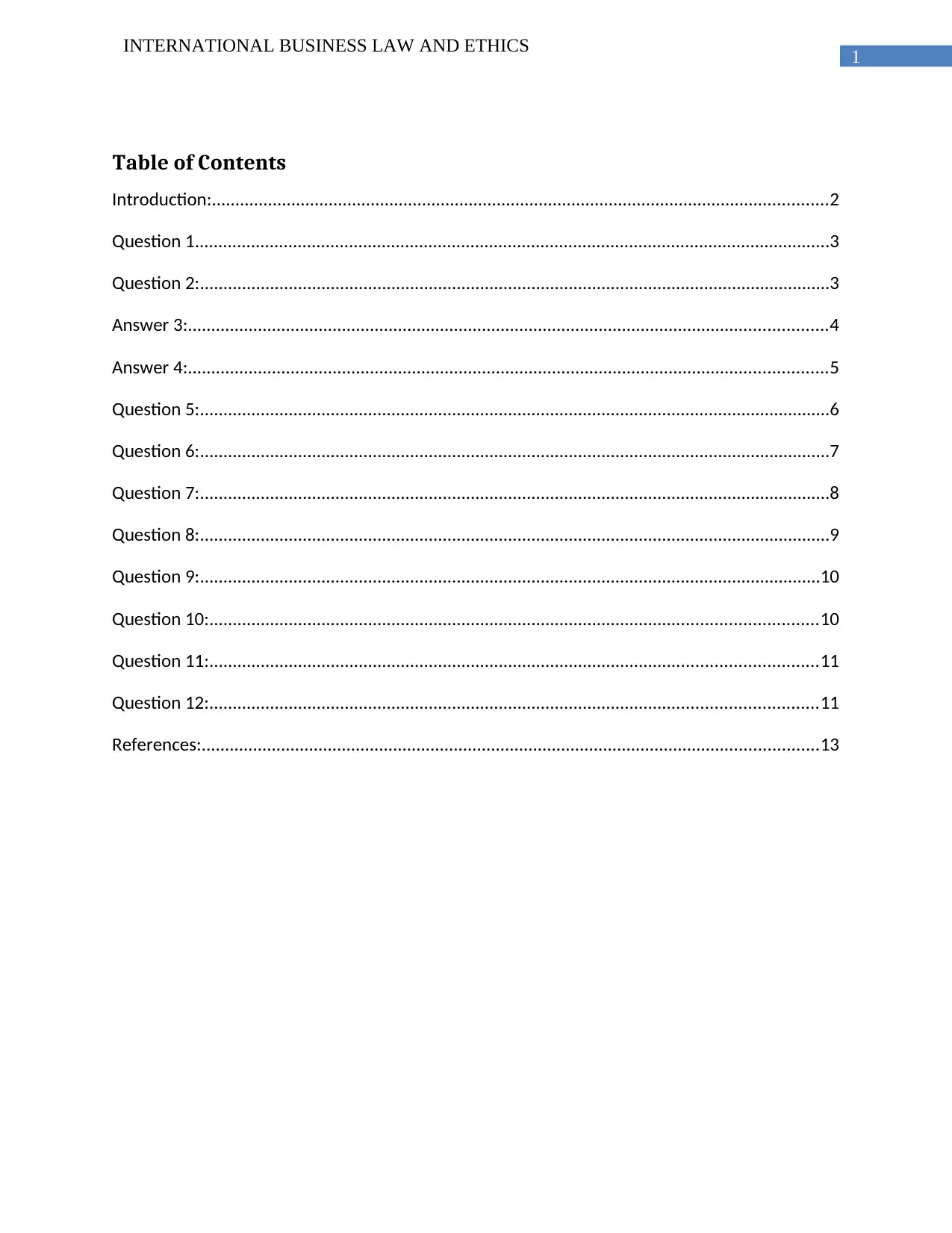
1
INTERNATIONAL BUSINESS LAW AND ETHICS
Table of Contents
Introduction:....................................................................................................................................2
Question 1........................................................................................................................................3
Question 2:.......................................................................................................................................3
Answer 3:.........................................................................................................................................4
Answer 4:.........................................................................................................................................5
Question 5:.......................................................................................................................................6
Question 6:.......................................................................................................................................7
Question 7:.......................................................................................................................................8
Question 8:.......................................................................................................................................9
Question 9:.....................................................................................................................................10
Question 10:..................................................................................................................................10
Question 11:..................................................................................................................................11
Question 12:..................................................................................................................................11
References:....................................................................................................................................13
INTERNATIONAL BUSINESS LAW AND ETHICS
Table of Contents
Introduction:....................................................................................................................................2
Question 1........................................................................................................................................3
Question 2:.......................................................................................................................................3
Answer 3:.........................................................................................................................................4
Answer 4:.........................................................................................................................................5
Question 5:.......................................................................................................................................6
Question 6:.......................................................................................................................................7
Question 7:.......................................................................................................................................8
Question 8:.......................................................................................................................................9
Question 9:.....................................................................................................................................10
Question 10:..................................................................................................................................10
Question 11:..................................................................................................................................11
Question 12:..................................................................................................................................11
References:....................................................................................................................................13
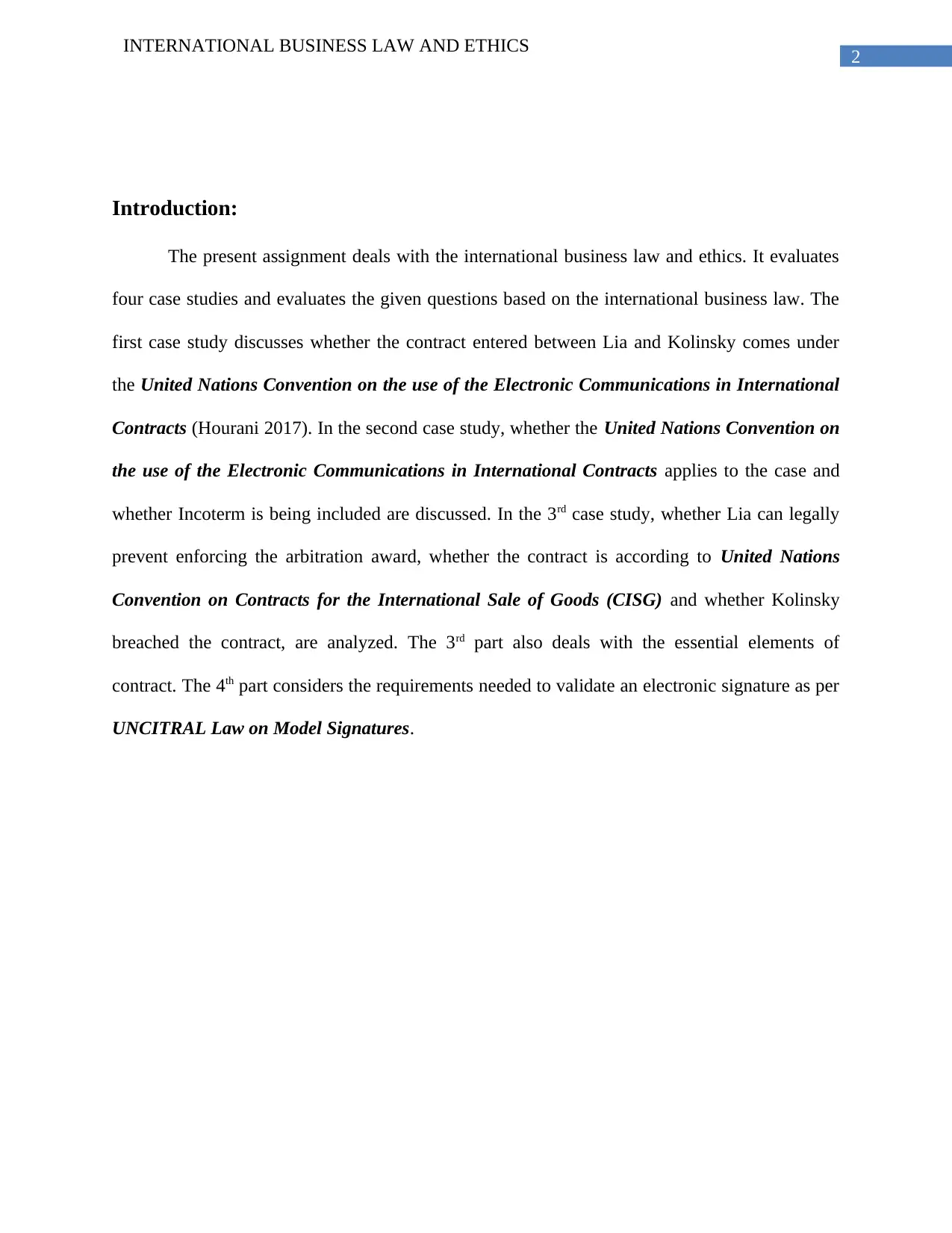
2
INTERNATIONAL BUSINESS LAW AND ETHICS
Introduction:
The present assignment deals with the international business law and ethics. It evaluates
four case studies and evaluates the given questions based on the international business law. The
first case study discusses whether the contract entered between Lia and Kolinsky comes under
the United Nations Convention on the use of the Electronic Communications in International
Contracts (Hourani 2017). In the second case study, whether the United Nations Convention on
the use of the Electronic Communications in International Contracts applies to the case and
whether Incoterm is being included are discussed. In the 3rd case study, whether Lia can legally
prevent enforcing the arbitration award, whether the contract is according to United Nations
Convention on Contracts for the International Sale of Goods (CISG) and whether Kolinsky
breached the contract, are analyzed. The 3rd part also deals with the essential elements of
contract. The 4th part considers the requirements needed to validate an electronic signature as per
UNCITRAL Law on Model Signatures.
INTERNATIONAL BUSINESS LAW AND ETHICS
Introduction:
The present assignment deals with the international business law and ethics. It evaluates
four case studies and evaluates the given questions based on the international business law. The
first case study discusses whether the contract entered between Lia and Kolinsky comes under
the United Nations Convention on the use of the Electronic Communications in International
Contracts (Hourani 2017). In the second case study, whether the United Nations Convention on
the use of the Electronic Communications in International Contracts applies to the case and
whether Incoterm is being included are discussed. In the 3rd case study, whether Lia can legally
prevent enforcing the arbitration award, whether the contract is according to United Nations
Convention on Contracts for the International Sale of Goods (CISG) and whether Kolinsky
breached the contract, are analyzed. The 3rd part also deals with the essential elements of
contract. The 4th part considers the requirements needed to validate an electronic signature as per
UNCITRAL Law on Model Signatures.
⊘ This is a preview!⊘
Do you want full access?
Subscribe today to unlock all pages.

Trusted by 1+ million students worldwide
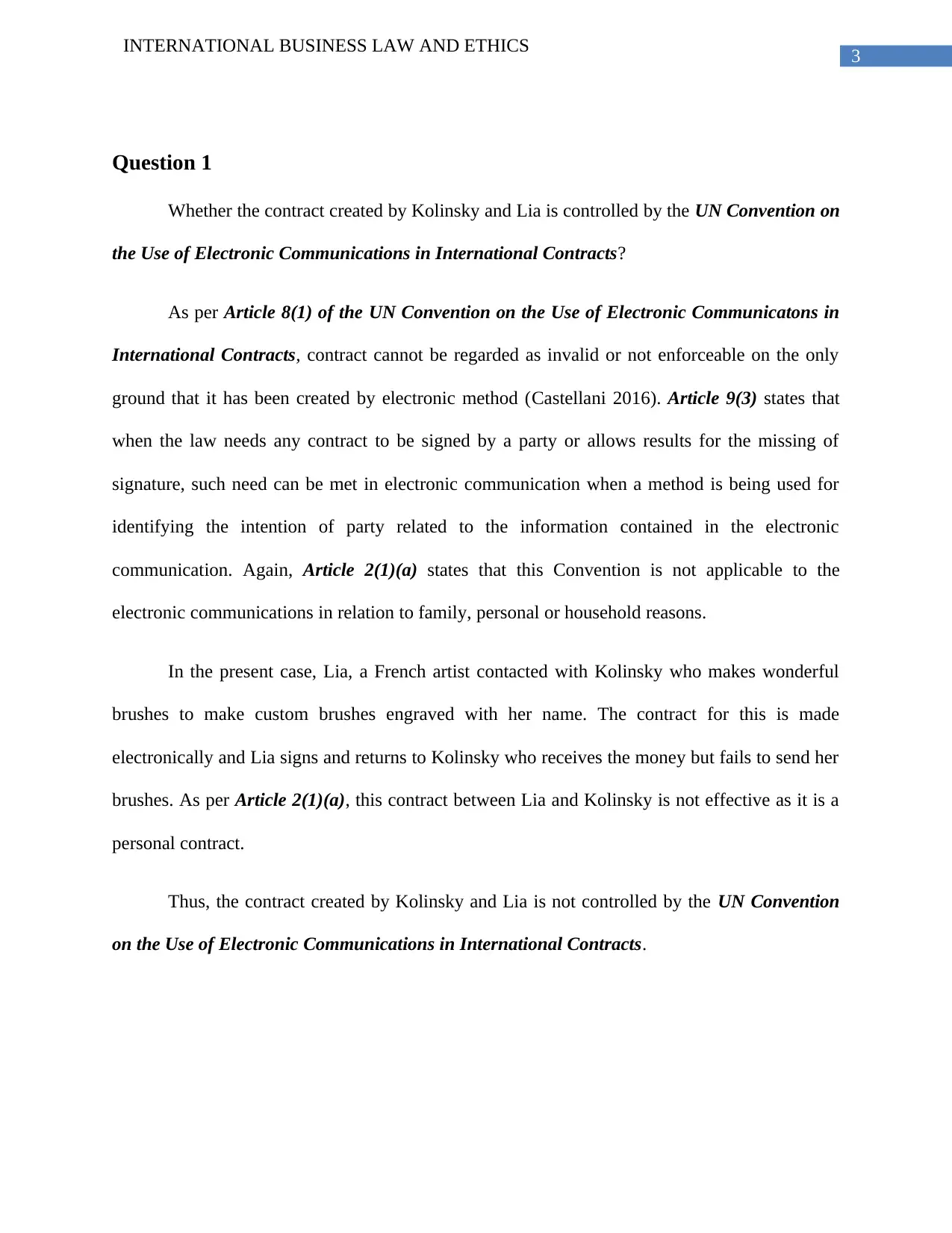
3
INTERNATIONAL BUSINESS LAW AND ETHICS
Question 1
Whether the contract created by Kolinsky and Lia is controlled by the UN Convention on
the Use of Electronic Communications in International Contracts?
As per Article 8(1) of the UN Convention on the Use of Electronic Communicatons in
International Contracts, contract cannot be regarded as invalid or not enforceable on the only
ground that it has been created by electronic method (Castellani 2016). Article 9(3) states that
when the law needs any contract to be signed by a party or allows results for the missing of
signature, such need can be met in electronic communication when a method is being used for
identifying the intention of party related to the information contained in the electronic
communication. Again, Article 2(1)(a) states that this Convention is not applicable to the
electronic communications in relation to family, personal or household reasons.
In the present case, Lia, a French artist contacted with Kolinsky who makes wonderful
brushes to make custom brushes engraved with her name. The contract for this is made
electronically and Lia signs and returns to Kolinsky who receives the money but fails to send her
brushes. As per Article 2(1)(a), this contract between Lia and Kolinsky is not effective as it is a
personal contract.
Thus, the contract created by Kolinsky and Lia is not controlled by the UN Convention
on the Use of Electronic Communications in International Contracts.
INTERNATIONAL BUSINESS LAW AND ETHICS
Question 1
Whether the contract created by Kolinsky and Lia is controlled by the UN Convention on
the Use of Electronic Communications in International Contracts?
As per Article 8(1) of the UN Convention on the Use of Electronic Communicatons in
International Contracts, contract cannot be regarded as invalid or not enforceable on the only
ground that it has been created by electronic method (Castellani 2016). Article 9(3) states that
when the law needs any contract to be signed by a party or allows results for the missing of
signature, such need can be met in electronic communication when a method is being used for
identifying the intention of party related to the information contained in the electronic
communication. Again, Article 2(1)(a) states that this Convention is not applicable to the
electronic communications in relation to family, personal or household reasons.
In the present case, Lia, a French artist contacted with Kolinsky who makes wonderful
brushes to make custom brushes engraved with her name. The contract for this is made
electronically and Lia signs and returns to Kolinsky who receives the money but fails to send her
brushes. As per Article 2(1)(a), this contract between Lia and Kolinsky is not effective as it is a
personal contract.
Thus, the contract created by Kolinsky and Lia is not controlled by the UN Convention
on the Use of Electronic Communications in International Contracts.
Paraphrase This Document
Need a fresh take? Get an instant paraphrase of this document with our AI Paraphraser
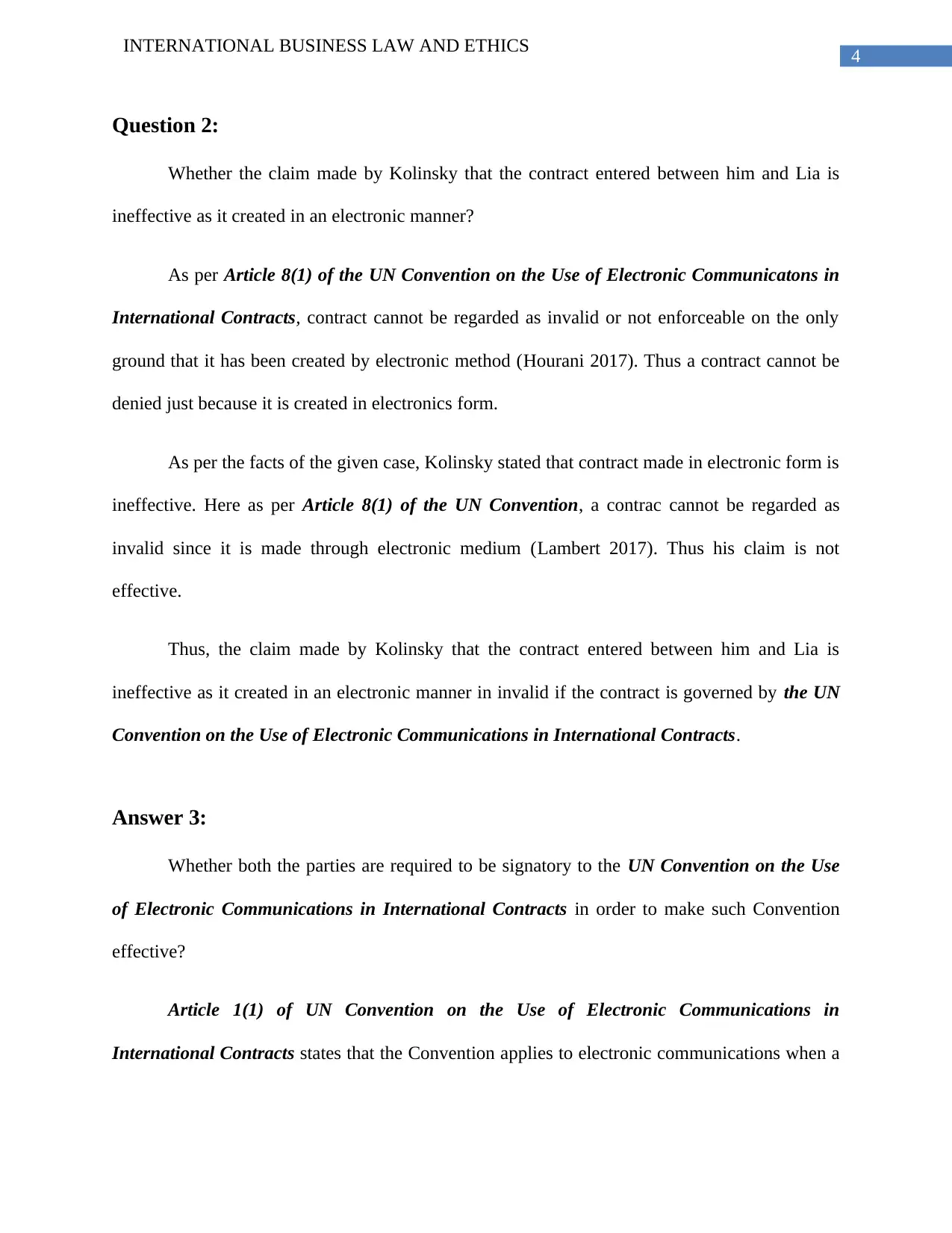
4
INTERNATIONAL BUSINESS LAW AND ETHICS
Question 2:
Whether the claim made by Kolinsky that the contract entered between him and Lia is
ineffective as it created in an electronic manner?
As per Article 8(1) of the UN Convention on the Use of Electronic Communicatons in
International Contracts, contract cannot be regarded as invalid or not enforceable on the only
ground that it has been created by electronic method (Hourani 2017). Thus a contract cannot be
denied just because it is created in electronics form.
As per the facts of the given case, Kolinsky stated that contract made in electronic form is
ineffective. Here as per Article 8(1) of the UN Convention, a contrac cannot be regarded as
invalid since it is made through electronic medium (Lambert 2017). Thus his claim is not
effective.
Thus, the claim made by Kolinsky that the contract entered between him and Lia is
ineffective as it created in an electronic manner in invalid if the contract is governed by the UN
Convention on the Use of Electronic Communications in International Contracts.
Answer 3:
Whether both the parties are required to be signatory to the UN Convention on the Use
of Electronic Communications in International Contracts in order to make such Convention
effective?
Article 1(1) of UN Convention on the Use of Electronic Communications in
International Contracts states that the Convention applies to electronic communications when a
INTERNATIONAL BUSINESS LAW AND ETHICS
Question 2:
Whether the claim made by Kolinsky that the contract entered between him and Lia is
ineffective as it created in an electronic manner?
As per Article 8(1) of the UN Convention on the Use of Electronic Communicatons in
International Contracts, contract cannot be regarded as invalid or not enforceable on the only
ground that it has been created by electronic method (Hourani 2017). Thus a contract cannot be
denied just because it is created in electronics form.
As per the facts of the given case, Kolinsky stated that contract made in electronic form is
ineffective. Here as per Article 8(1) of the UN Convention, a contrac cannot be regarded as
invalid since it is made through electronic medium (Lambert 2017). Thus his claim is not
effective.
Thus, the claim made by Kolinsky that the contract entered between him and Lia is
ineffective as it created in an electronic manner in invalid if the contract is governed by the UN
Convention on the Use of Electronic Communications in International Contracts.
Answer 3:
Whether both the parties are required to be signatory to the UN Convention on the Use
of Electronic Communications in International Contracts in order to make such Convention
effective?
Article 1(1) of UN Convention on the Use of Electronic Communications in
International Contracts states that the Convention applies to electronic communications when a
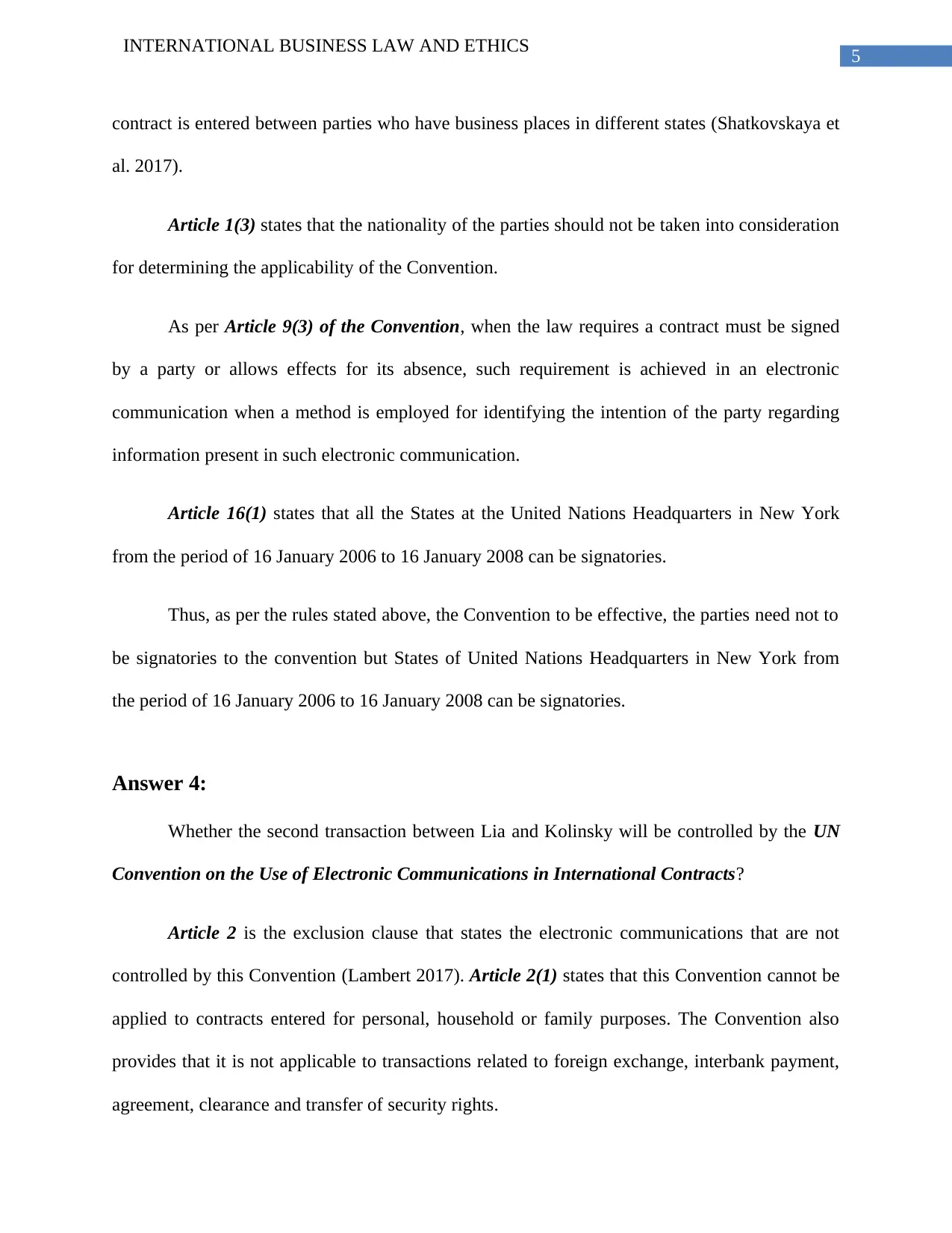
5
INTERNATIONAL BUSINESS LAW AND ETHICS
contract is entered between parties who have business places in different states (Shatkovskaya et
al. 2017).
Article 1(3) states that the nationality of the parties should not be taken into consideration
for determining the applicability of the Convention.
As per Article 9(3) of the Convention, when the law requires a contract must be signed
by a party or allows effects for its absence, such requirement is achieved in an electronic
communication when a method is employed for identifying the intention of the party regarding
information present in such electronic communication.
Article 16(1) states that all the States at the United Nations Headquarters in New York
from the period of 16 January 2006 to 16 January 2008 can be signatories.
Thus, as per the rules stated above, the Convention to be effective, the parties need not to
be signatories to the convention but States of United Nations Headquarters in New York from
the period of 16 January 2006 to 16 January 2008 can be signatories.
Answer 4:
Whether the second transaction between Lia and Kolinsky will be controlled by the UN
Convention on the Use of Electronic Communications in International Contracts?
Article 2 is the exclusion clause that states the electronic communications that are not
controlled by this Convention (Lambert 2017). Article 2(1) states that this Convention cannot be
applied to contracts entered for personal, household or family purposes. The Convention also
provides that it is not applicable to transactions related to foreign exchange, interbank payment,
agreement, clearance and transfer of security rights.
INTERNATIONAL BUSINESS LAW AND ETHICS
contract is entered between parties who have business places in different states (Shatkovskaya et
al. 2017).
Article 1(3) states that the nationality of the parties should not be taken into consideration
for determining the applicability of the Convention.
As per Article 9(3) of the Convention, when the law requires a contract must be signed
by a party or allows effects for its absence, such requirement is achieved in an electronic
communication when a method is employed for identifying the intention of the party regarding
information present in such electronic communication.
Article 16(1) states that all the States at the United Nations Headquarters in New York
from the period of 16 January 2006 to 16 January 2008 can be signatories.
Thus, as per the rules stated above, the Convention to be effective, the parties need not to
be signatories to the convention but States of United Nations Headquarters in New York from
the period of 16 January 2006 to 16 January 2008 can be signatories.
Answer 4:
Whether the second transaction between Lia and Kolinsky will be controlled by the UN
Convention on the Use of Electronic Communications in International Contracts?
Article 2 is the exclusion clause that states the electronic communications that are not
controlled by this Convention (Lambert 2017). Article 2(1) states that this Convention cannot be
applied to contracts entered for personal, household or family purposes. The Convention also
provides that it is not applicable to transactions related to foreign exchange, interbank payment,
agreement, clearance and transfer of security rights.
⊘ This is a preview!⊘
Do you want full access?
Subscribe today to unlock all pages.

Trusted by 1+ million students worldwide
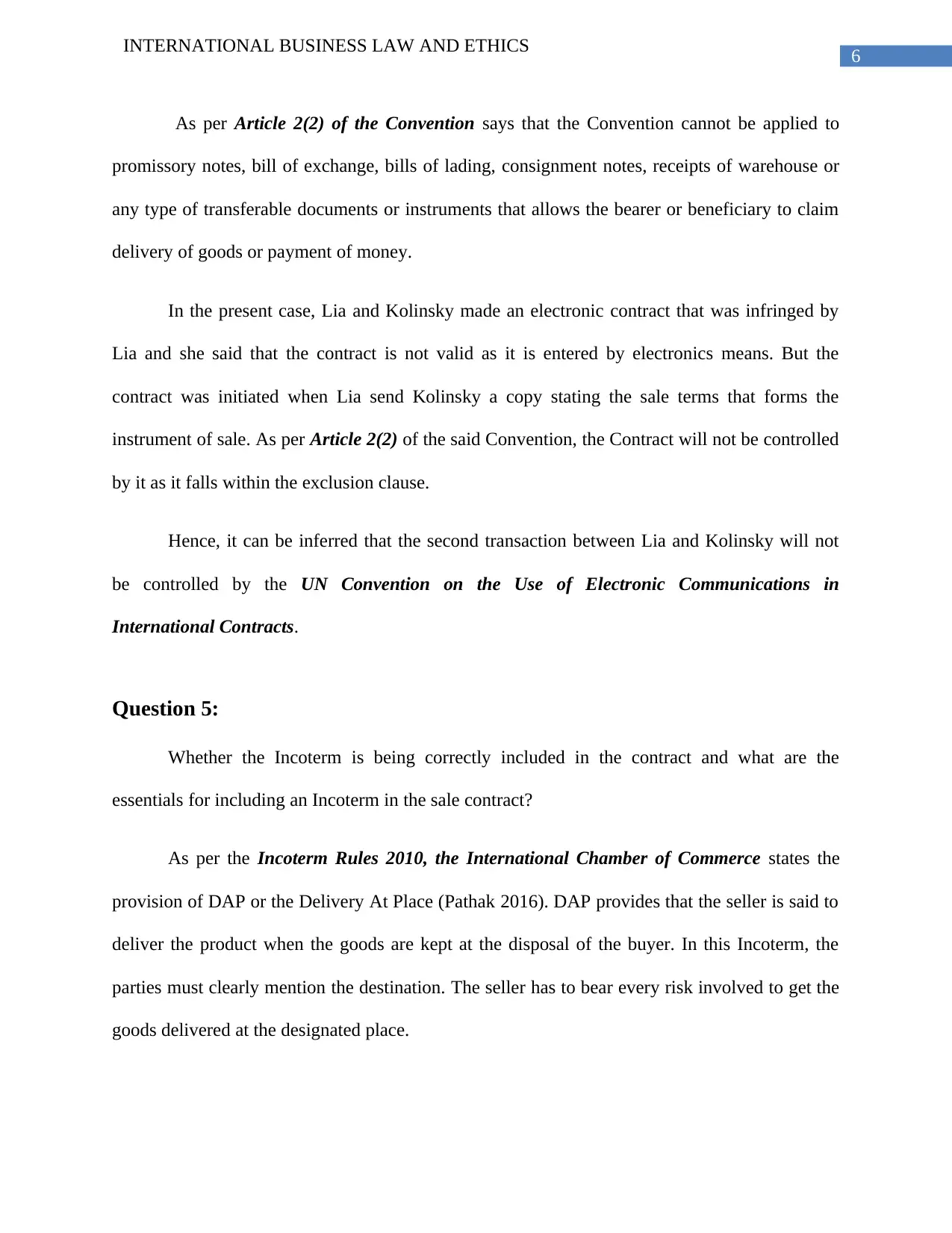
6
INTERNATIONAL BUSINESS LAW AND ETHICS
As per Article 2(2) of the Convention says that the Convention cannot be applied to
promissory notes, bill of exchange, bills of lading, consignment notes, receipts of warehouse or
any type of transferable documents or instruments that allows the bearer or beneficiary to claim
delivery of goods or payment of money.
In the present case, Lia and Kolinsky made an electronic contract that was infringed by
Lia and she said that the contract is not valid as it is entered by electronics means. But the
contract was initiated when Lia send Kolinsky a copy stating the sale terms that forms the
instrument of sale. As per Article 2(2) of the said Convention, the Contract will not be controlled
by it as it falls within the exclusion clause.
Hence, it can be inferred that the second transaction between Lia and Kolinsky will not
be controlled by the UN Convention on the Use of Electronic Communications in
International Contracts.
Question 5:
Whether the Incoterm is being correctly included in the contract and what are the
essentials for including an Incoterm in the sale contract?
As per the Incoterm Rules 2010, the International Chamber of Commerce states the
provision of DAP or the Delivery At Place (Pathak 2016). DAP provides that the seller is said to
deliver the product when the goods are kept at the disposal of the buyer. In this Incoterm, the
parties must clearly mention the destination. The seller has to bear every risk involved to get the
goods delivered at the designated place.
INTERNATIONAL BUSINESS LAW AND ETHICS
As per Article 2(2) of the Convention says that the Convention cannot be applied to
promissory notes, bill of exchange, bills of lading, consignment notes, receipts of warehouse or
any type of transferable documents or instruments that allows the bearer or beneficiary to claim
delivery of goods or payment of money.
In the present case, Lia and Kolinsky made an electronic contract that was infringed by
Lia and she said that the contract is not valid as it is entered by electronics means. But the
contract was initiated when Lia send Kolinsky a copy stating the sale terms that forms the
instrument of sale. As per Article 2(2) of the said Convention, the Contract will not be controlled
by it as it falls within the exclusion clause.
Hence, it can be inferred that the second transaction between Lia and Kolinsky will not
be controlled by the UN Convention on the Use of Electronic Communications in
International Contracts.
Question 5:
Whether the Incoterm is being correctly included in the contract and what are the
essentials for including an Incoterm in the sale contract?
As per the Incoterm Rules 2010, the International Chamber of Commerce states the
provision of DAP or the Delivery At Place (Pathak 2016). DAP provides that the seller is said to
deliver the product when the goods are kept at the disposal of the buyer. In this Incoterm, the
parties must clearly mention the destination. The seller has to bear every risk involved to get the
goods delivered at the designated place.
Paraphrase This Document
Need a fresh take? Get an instant paraphrase of this document with our AI Paraphraser
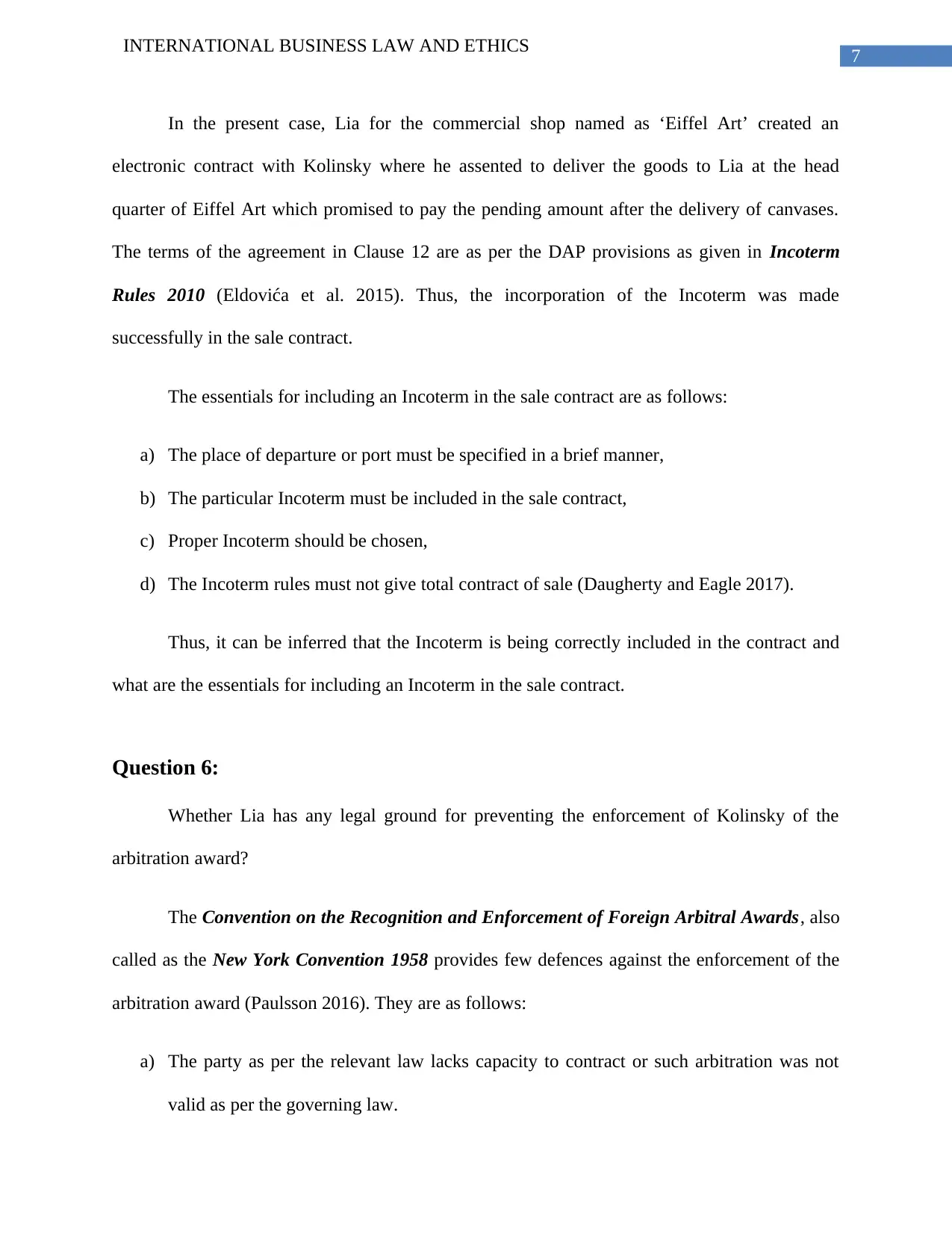
7
INTERNATIONAL BUSINESS LAW AND ETHICS
In the present case, Lia for the commercial shop named as ‘Eiffel Art’ created an
electronic contract with Kolinsky where he assented to deliver the goods to Lia at the head
quarter of Eiffel Art which promised to pay the pending amount after the delivery of canvases.
The terms of the agreement in Clause 12 are as per the DAP provisions as given in Incoterm
Rules 2010 (Eldovića et al. 2015). Thus, the incorporation of the Incoterm was made
successfully in the sale contract.
The essentials for including an Incoterm in the sale contract are as follows:
a) The place of departure or port must be specified in a brief manner,
b) The particular Incoterm must be included in the sale contract,
c) Proper Incoterm should be chosen,
d) The Incoterm rules must not give total contract of sale (Daugherty and Eagle 2017).
Thus, it can be inferred that the Incoterm is being correctly included in the contract and
what are the essentials for including an Incoterm in the sale contract.
Question 6:
Whether Lia has any legal ground for preventing the enforcement of Kolinsky of the
arbitration award?
The Convention on the Recognition and Enforcement of Foreign Arbitral Awards, also
called as the New York Convention 1958 provides few defences against the enforcement of the
arbitration award (Paulsson 2016). They are as follows:
a) The party as per the relevant law lacks capacity to contract or such arbitration was not
valid as per the governing law.
INTERNATIONAL BUSINESS LAW AND ETHICS
In the present case, Lia for the commercial shop named as ‘Eiffel Art’ created an
electronic contract with Kolinsky where he assented to deliver the goods to Lia at the head
quarter of Eiffel Art which promised to pay the pending amount after the delivery of canvases.
The terms of the agreement in Clause 12 are as per the DAP provisions as given in Incoterm
Rules 2010 (Eldovića et al. 2015). Thus, the incorporation of the Incoterm was made
successfully in the sale contract.
The essentials for including an Incoterm in the sale contract are as follows:
a) The place of departure or port must be specified in a brief manner,
b) The particular Incoterm must be included in the sale contract,
c) Proper Incoterm should be chosen,
d) The Incoterm rules must not give total contract of sale (Daugherty and Eagle 2017).
Thus, it can be inferred that the Incoterm is being correctly included in the contract and
what are the essentials for including an Incoterm in the sale contract.
Question 6:
Whether Lia has any legal ground for preventing the enforcement of Kolinsky of the
arbitration award?
The Convention on the Recognition and Enforcement of Foreign Arbitral Awards, also
called as the New York Convention 1958 provides few defences against the enforcement of the
arbitration award (Paulsson 2016). They are as follows:
a) The party as per the relevant law lacks capacity to contract or such arbitration was not
valid as per the governing law.
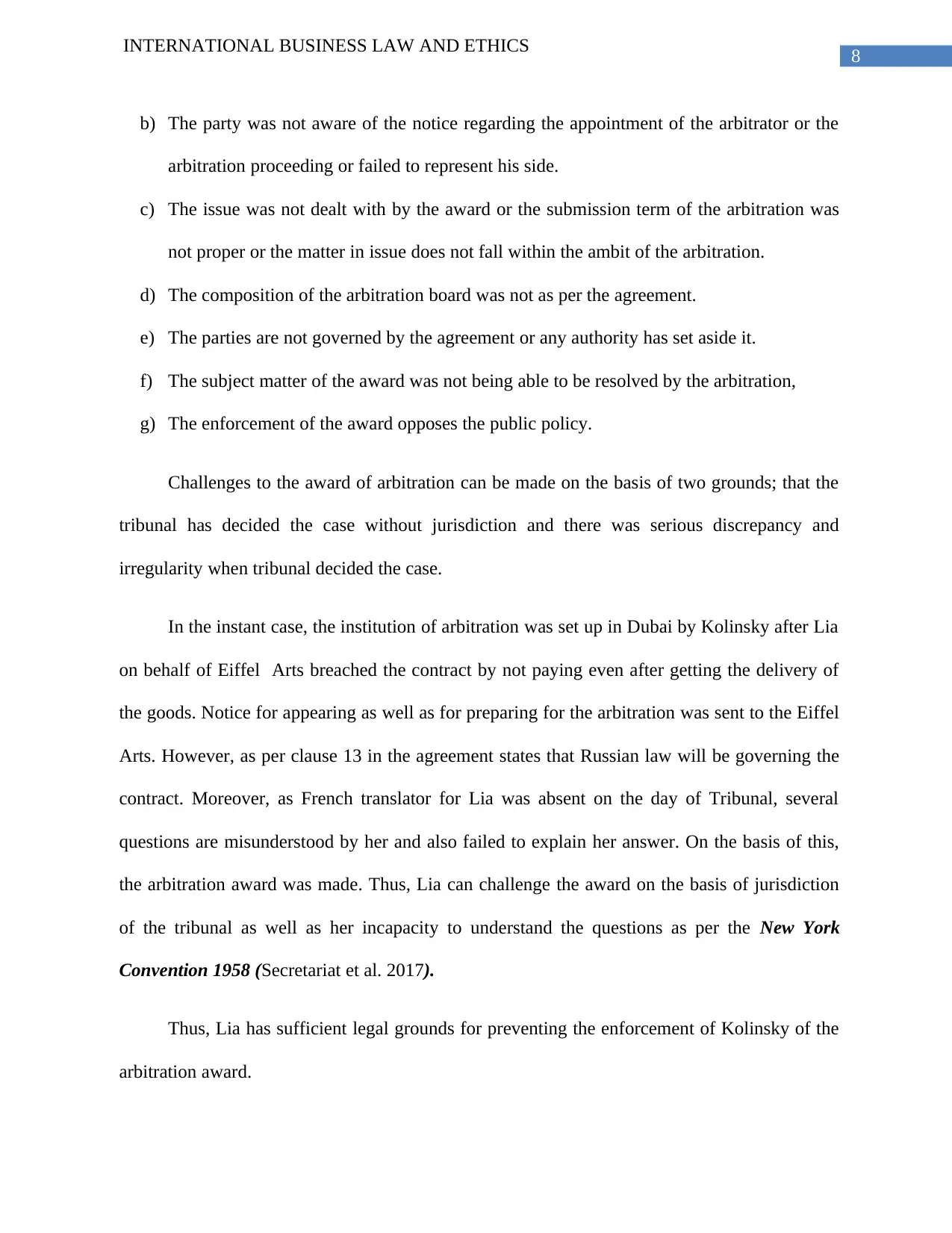
8
INTERNATIONAL BUSINESS LAW AND ETHICS
b) The party was not aware of the notice regarding the appointment of the arbitrator or the
arbitration proceeding or failed to represent his side.
c) The issue was not dealt with by the award or the submission term of the arbitration was
not proper or the matter in issue does not fall within the ambit of the arbitration.
d) The composition of the arbitration board was not as per the agreement.
e) The parties are not governed by the agreement or any authority has set aside it.
f) The subject matter of the award was not being able to be resolved by the arbitration,
g) The enforcement of the award opposes the public policy.
Challenges to the award of arbitration can be made on the basis of two grounds; that the
tribunal has decided the case without jurisdiction and there was serious discrepancy and
irregularity when tribunal decided the case.
In the instant case, the institution of arbitration was set up in Dubai by Kolinsky after Lia
on behalf of Eiffel Arts breached the contract by not paying even after getting the delivery of
the goods. Notice for appearing as well as for preparing for the arbitration was sent to the Eiffel
Arts. However, as per clause 13 in the agreement states that Russian law will be governing the
contract. Moreover, as French translator for Lia was absent on the day of Tribunal, several
questions are misunderstood by her and also failed to explain her answer. On the basis of this,
the arbitration award was made. Thus, Lia can challenge the award on the basis of jurisdiction
of the tribunal as well as her incapacity to understand the questions as per the New York
Convention 1958 (Secretariat et al. 2017).
Thus, Lia has sufficient legal grounds for preventing the enforcement of Kolinsky of the
arbitration award.
INTERNATIONAL BUSINESS LAW AND ETHICS
b) The party was not aware of the notice regarding the appointment of the arbitrator or the
arbitration proceeding or failed to represent his side.
c) The issue was not dealt with by the award or the submission term of the arbitration was
not proper or the matter in issue does not fall within the ambit of the arbitration.
d) The composition of the arbitration board was not as per the agreement.
e) The parties are not governed by the agreement or any authority has set aside it.
f) The subject matter of the award was not being able to be resolved by the arbitration,
g) The enforcement of the award opposes the public policy.
Challenges to the award of arbitration can be made on the basis of two grounds; that the
tribunal has decided the case without jurisdiction and there was serious discrepancy and
irregularity when tribunal decided the case.
In the instant case, the institution of arbitration was set up in Dubai by Kolinsky after Lia
on behalf of Eiffel Arts breached the contract by not paying even after getting the delivery of
the goods. Notice for appearing as well as for preparing for the arbitration was sent to the Eiffel
Arts. However, as per clause 13 in the agreement states that Russian law will be governing the
contract. Moreover, as French translator for Lia was absent on the day of Tribunal, several
questions are misunderstood by her and also failed to explain her answer. On the basis of this,
the arbitration award was made. Thus, Lia can challenge the award on the basis of jurisdiction
of the tribunal as well as her incapacity to understand the questions as per the New York
Convention 1958 (Secretariat et al. 2017).
Thus, Lia has sufficient legal grounds for preventing the enforcement of Kolinsky of the
arbitration award.
⊘ This is a preview!⊘
Do you want full access?
Subscribe today to unlock all pages.

Trusted by 1+ million students worldwide
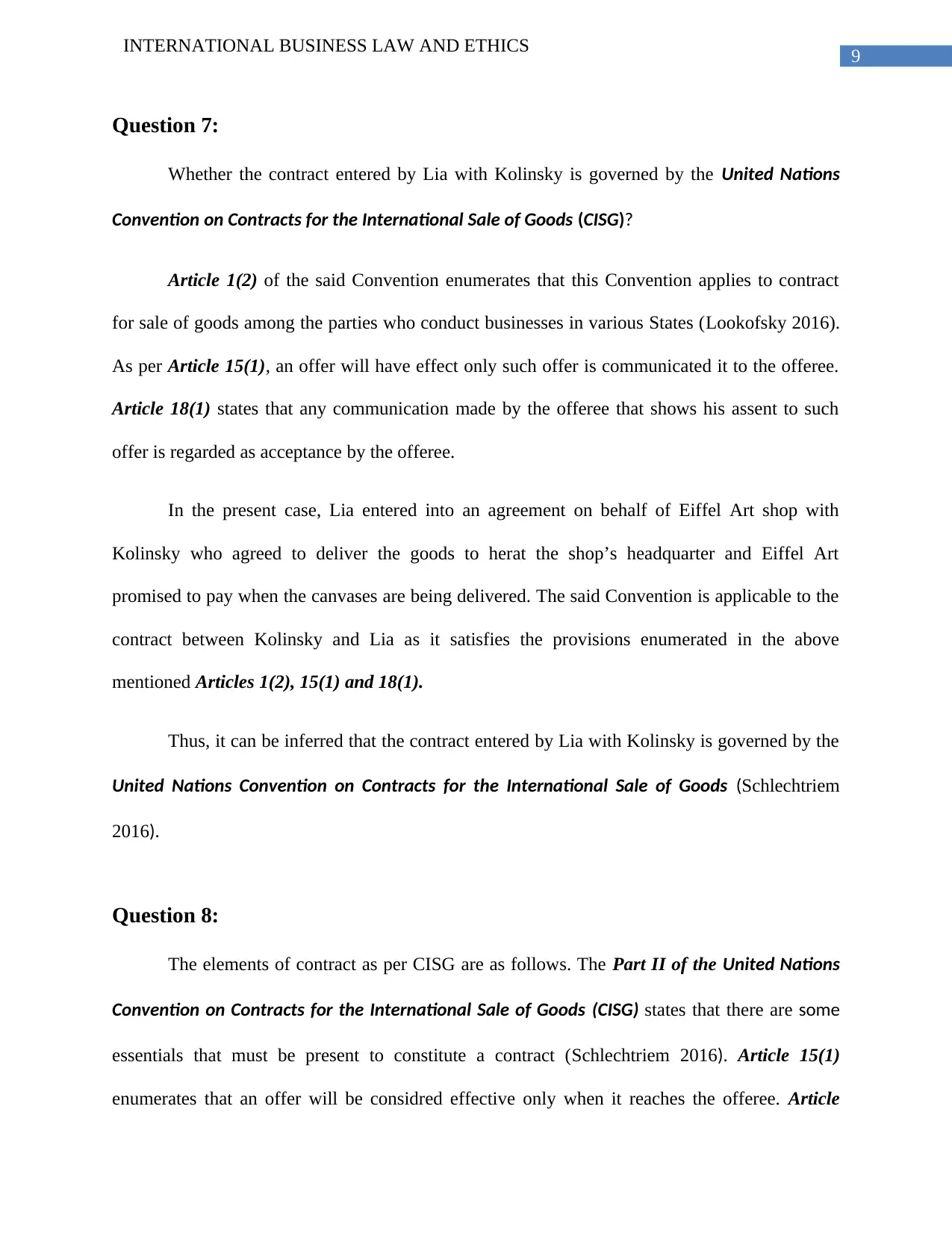
9
INTERNATIONAL BUSINESS LAW AND ETHICS
Question 7:
Whether the contract entered by Lia with Kolinsky is governed by the United Nations
Convention on Contracts for the International Sale of Goods (CISG)?
Article 1(2) of the said Convention enumerates that this Convention applies to contract
for sale of goods among the parties who conduct businesses in various States (Lookofsky 2016).
As per Article 15(1), an offer will have effect only such offer is communicated it to the offeree.
Article 18(1) states that any communication made by the offeree that shows his assent to such
offer is regarded as acceptance by the offeree.
In the present case, Lia entered into an agreement on behalf of Eiffel Art shop with
Kolinsky who agreed to deliver the goods to herat the shop’s headquarter and Eiffel Art
promised to pay when the canvases are being delivered. The said Convention is applicable to the
contract between Kolinsky and Lia as it satisfies the provisions enumerated in the above
mentioned Articles 1(2), 15(1) and 18(1).
Thus, it can be inferred that the contract entered by Lia with Kolinsky is governed by the
United Nations Convention on Contracts for the International Sale of Goods (Schlechtriem
2016).
Question 8:
The elements of contract as per CISG are as follows. The Part II of the United Nations
Convention on Contracts for the International Sale of Goods (CISG) states that there are some
essentials that must be present to constitute a contract (Schlechtriem 2016). Article 15(1)
enumerates that an offer will be considred effective only when it reaches the offeree. Article
INTERNATIONAL BUSINESS LAW AND ETHICS
Question 7:
Whether the contract entered by Lia with Kolinsky is governed by the United Nations
Convention on Contracts for the International Sale of Goods (CISG)?
Article 1(2) of the said Convention enumerates that this Convention applies to contract
for sale of goods among the parties who conduct businesses in various States (Lookofsky 2016).
As per Article 15(1), an offer will have effect only such offer is communicated it to the offeree.
Article 18(1) states that any communication made by the offeree that shows his assent to such
offer is regarded as acceptance by the offeree.
In the present case, Lia entered into an agreement on behalf of Eiffel Art shop with
Kolinsky who agreed to deliver the goods to herat the shop’s headquarter and Eiffel Art
promised to pay when the canvases are being delivered. The said Convention is applicable to the
contract between Kolinsky and Lia as it satisfies the provisions enumerated in the above
mentioned Articles 1(2), 15(1) and 18(1).
Thus, it can be inferred that the contract entered by Lia with Kolinsky is governed by the
United Nations Convention on Contracts for the International Sale of Goods (Schlechtriem
2016).
Question 8:
The elements of contract as per CISG are as follows. The Part II of the United Nations
Convention on Contracts for the International Sale of Goods (CISG) states that there are some
essentials that must be present to constitute a contract (Schlechtriem 2016). Article 15(1)
enumerates that an offer will be considred effective only when it reaches the offeree. Article
Paraphrase This Document
Need a fresh take? Get an instant paraphrase of this document with our AI Paraphraser
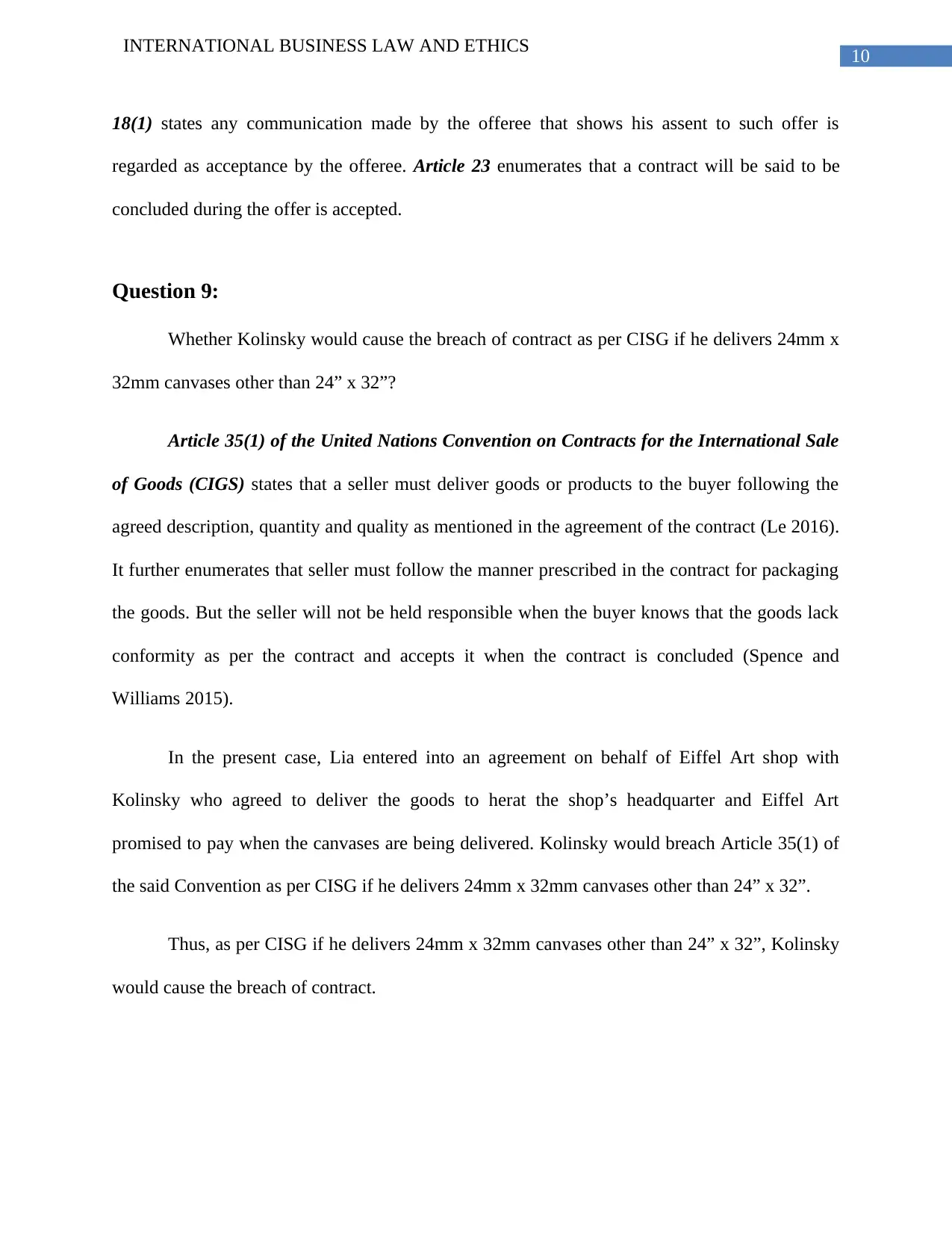
10
INTERNATIONAL BUSINESS LAW AND ETHICS
18(1) states any communication made by the offeree that shows his assent to such offer is
regarded as acceptance by the offeree. Article 23 enumerates that a contract will be said to be
concluded during the offer is accepted.
Question 9:
Whether Kolinsky would cause the breach of contract as per CISG if he delivers 24mm x
32mm canvases other than 24” x 32”?
Article 35(1) of the United Nations Convention on Contracts for the International Sale
of Goods (CIGS) states that a seller must deliver goods or products to the buyer following the
agreed description, quantity and quality as mentioned in the agreement of the contract (Le 2016).
It further enumerates that seller must follow the manner prescribed in the contract for packaging
the goods. But the seller will not be held responsible when the buyer knows that the goods lack
conformity as per the contract and accepts it when the contract is concluded (Spence and
Williams 2015).
In the present case, Lia entered into an agreement on behalf of Eiffel Art shop with
Kolinsky who agreed to deliver the goods to herat the shop’s headquarter and Eiffel Art
promised to pay when the canvases are being delivered. Kolinsky would breach Article 35(1) of
the said Convention as per CISG if he delivers 24mm x 32mm canvases other than 24” x 32”.
Thus, as per CISG if he delivers 24mm x 32mm canvases other than 24” x 32”, Kolinsky
would cause the breach of contract.
INTERNATIONAL BUSINESS LAW AND ETHICS
18(1) states any communication made by the offeree that shows his assent to such offer is
regarded as acceptance by the offeree. Article 23 enumerates that a contract will be said to be
concluded during the offer is accepted.
Question 9:
Whether Kolinsky would cause the breach of contract as per CISG if he delivers 24mm x
32mm canvases other than 24” x 32”?
Article 35(1) of the United Nations Convention on Contracts for the International Sale
of Goods (CIGS) states that a seller must deliver goods or products to the buyer following the
agreed description, quantity and quality as mentioned in the agreement of the contract (Le 2016).
It further enumerates that seller must follow the manner prescribed in the contract for packaging
the goods. But the seller will not be held responsible when the buyer knows that the goods lack
conformity as per the contract and accepts it when the contract is concluded (Spence and
Williams 2015).
In the present case, Lia entered into an agreement on behalf of Eiffel Art shop with
Kolinsky who agreed to deliver the goods to herat the shop’s headquarter and Eiffel Art
promised to pay when the canvases are being delivered. Kolinsky would breach Article 35(1) of
the said Convention as per CISG if he delivers 24mm x 32mm canvases other than 24” x 32”.
Thus, as per CISG if he delivers 24mm x 32mm canvases other than 24” x 32”, Kolinsky
would cause the breach of contract.
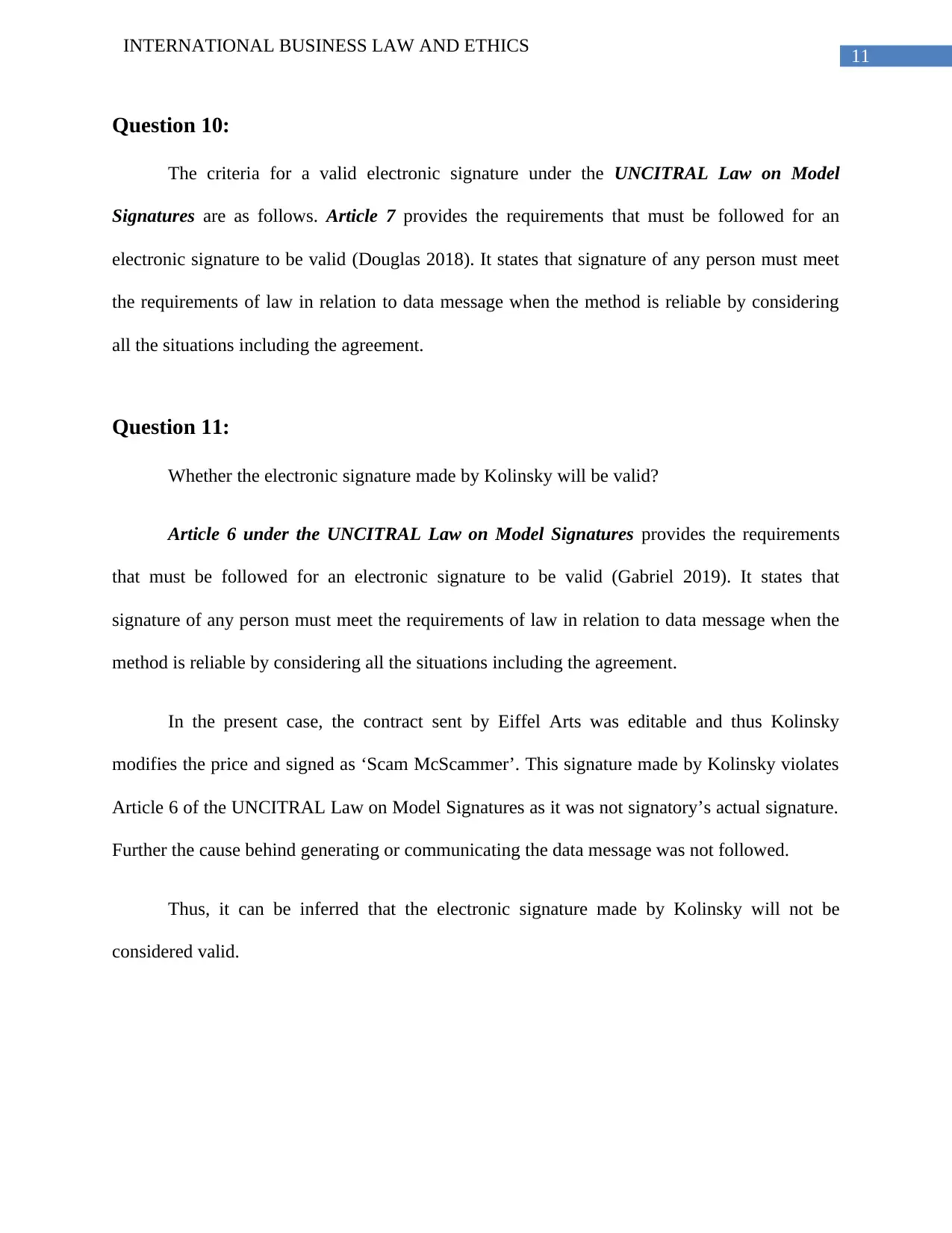
11
INTERNATIONAL BUSINESS LAW AND ETHICS
Question 10:
The criteria for a valid electronic signature under the UNCITRAL Law on Model
Signatures are as follows. Article 7 provides the requirements that must be followed for an
electronic signature to be valid (Douglas 2018). It states that signature of any person must meet
the requirements of law in relation to data message when the method is reliable by considering
all the situations including the agreement.
Question 11:
Whether the electronic signature made by Kolinsky will be valid?
Article 6 under the UNCITRAL Law on Model Signatures provides the requirements
that must be followed for an electronic signature to be valid (Gabriel 2019). It states that
signature of any person must meet the requirements of law in relation to data message when the
method is reliable by considering all the situations including the agreement.
In the present case, the contract sent by Eiffel Arts was editable and thus Kolinsky
modifies the price and signed as ‘Scam McScammer’. This signature made by Kolinsky violates
Article 6 of the UNCITRAL Law on Model Signatures as it was not signatory’s actual signature.
Further the cause behind generating or communicating the data message was not followed.
Thus, it can be inferred that the electronic signature made by Kolinsky will not be
considered valid.
INTERNATIONAL BUSINESS LAW AND ETHICS
Question 10:
The criteria for a valid electronic signature under the UNCITRAL Law on Model
Signatures are as follows. Article 7 provides the requirements that must be followed for an
electronic signature to be valid (Douglas 2018). It states that signature of any person must meet
the requirements of law in relation to data message when the method is reliable by considering
all the situations including the agreement.
Question 11:
Whether the electronic signature made by Kolinsky will be valid?
Article 6 under the UNCITRAL Law on Model Signatures provides the requirements
that must be followed for an electronic signature to be valid (Gabriel 2019). It states that
signature of any person must meet the requirements of law in relation to data message when the
method is reliable by considering all the situations including the agreement.
In the present case, the contract sent by Eiffel Arts was editable and thus Kolinsky
modifies the price and signed as ‘Scam McScammer’. This signature made by Kolinsky violates
Article 6 of the UNCITRAL Law on Model Signatures as it was not signatory’s actual signature.
Further the cause behind generating or communicating the data message was not followed.
Thus, it can be inferred that the electronic signature made by Kolinsky will not be
considered valid.
⊘ This is a preview!⊘
Do you want full access?
Subscribe today to unlock all pages.

Trusted by 1+ million students worldwide
1 out of 15
Related Documents
Your All-in-One AI-Powered Toolkit for Academic Success.
+13062052269
info@desklib.com
Available 24*7 on WhatsApp / Email
![[object Object]](/_next/static/media/star-bottom.7253800d.svg)
Unlock your academic potential
Copyright © 2020–2026 A2Z Services. All Rights Reserved. Developed and managed by ZUCOL.




